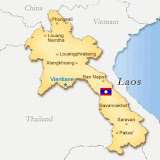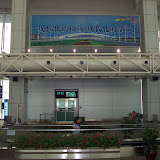The college in Chi Ma Wan is in an urgent need to relocate because its campus is overcrowded (120 students at the capacity of 60) and shabby. Residents of Mui Wo, the site where the college applied to use, strongly opposed the college application. They say they support rehabilitation services, but they also need to use the site for education of their own children and they fear that the “drug addicts” will impose negative influence on the community. They somehow show the “Not In My Backyard” mentality.
I paid a visit to the college last Saturday for a story. The college is running down. No hot water is available for bathing and it is overcrowded.
I did not need to go through security checks to enter the college. No one accompanied me walking around – I could walk freely inside the campus WITHOUT fearing that the students might do something harmful to me.
 Students are preparing food.
Students are preparing food.Here is the story.
----------------------------
Getting back to the straight and narrow
There are no security checks for visitors at Christian Zheng Sheng College in Chi Ma Wan. Visitors can go unescorted, wherever they choose on the campus, where young drug abusers are undergoing rehabilitation. Visitors may even take photos of students.
It’s the city’s only private boarding school for young drug abusers.
Though many of the students have committed crimes that go beyond the taking of drugs, they are treated with respect and expected to take responsibility for themselves.
 He is the first student greeting me.
He is the first student greeting me.Principal Alman Chan Siu-cheuk stresses that students are not incarcerated and should not be considered inmates, though most have been referred by probation officers for stays of about 30 months.
“We are not afraid that the students will be in dispute with visitors. We are confident about our students,” he said. “They are empowered if we stress that they are just students who made mistakes, but not inmates who committed crimes. The students’ identity motivates them to work hard for exams and integrate with community.”
Lau Yin-chun, a 17-year-old who is at the college for three months after committing theft, wants to be thought of as any other normal person.
“I was a set of numbers in the rehabilitation center where I stayed before coming here. Now, people call me by my name,” said Yin-chun, who did not hesitate to open up when he was approached by a reporter.
The school does not use medications in its rehabilitation therapy. Responsibility and self-discipline are the cornerstones to the treatment. The 120 students of the college get up every morning at 6:30. They have morning assembly and Bible reading. By lunch time they have put in three hours of academic study. After lunch they work another three hours and have a couple of hours of free time before dinner. Bed time is 10 pm.Students and teachers share dormitories and the bathrooms which have no hot water.
 The shelves will collapse during heavy rains and typhoons.
The shelves will collapse during heavy rains and typhoons.Students do their own cooking and laundry. Part of their responsibilities require that they help clean up the grounds and assist in renovations. The place is short on regular facilities.
One project took several years as students of succeeding classes removed rocks from an outdoor basketball court. It proved to be good endurance training. They work side by side with teachers, feeling more like equals than subordinates or inferiors. There are no special privileges for teachers.
“The senior students who are the leaders are often the last ones to receive gifts. They are serving others and taking more responsibility,” Chan said.
There’s also some vocational in addition to academic studies. There’s pizza making, photography, video production, design and logistics. Some teaching facilities are pretty sub-standard. A lot of chairs are broken. On the other hand by not replacing broken chairs the school has been able to buy state-of-the-art equipment rarely seen in mainstream schools. The 20 MacBook Pro computers, the HK$48,000 camera and the HK$18,000 lens are some examples.
“I cut staff pay for that. Teachers here are only paid 60 percent of salary offered by other schools,” said Chan whose pay is also 40 percent less. The Christian Zheng Sheng Association has businesses in Cheung Chau, including a pizza shop and tea house. It gets orders for producing videos, T-shirts, and printing names on mobile phone. Even the Macao government asked the association to produce a video about taking drugs.
 Students are heading to Cheung Chau for video production.
Students are heading to Cheung Chau for video production.The businesses have an annual turnover of about HK$1 million.
“We are a social enterprise,” Chan said, adding that students emerging from the school will become more competitive in the job market because of the training they have received.
There are other advantages. Some students were taken on an exchange visit to the United States. Chan said more than 70 percent of the school’s graduates do not return to drugs. “They dare to face the camera. They are achievers. They do not consider themselves criminals,” Chan said.
------------------------
I am impressed by the students and the staff of the college. I hope the college will continue being blessed no matter whether they will move to Mui Wo. It is expected that the students and staff are under pressure to continue performing well. Given that huge support for the college is pouring, a single and minor mistake can of the college will disappoint many and jeopardize the college image.
Everyone makes mistakes, and they should be welcomed if they have corrected.










2 comments:
Do they receive any financial support from the government? I really respect the people who contibute their effort to help those in needs.
Teoh,
The school has no financial support from the government. But the students there can apply for government subsidies to pay the school fees.
Most of the school income is from the school fees, and some from donations and the businesses.
Post a Comment